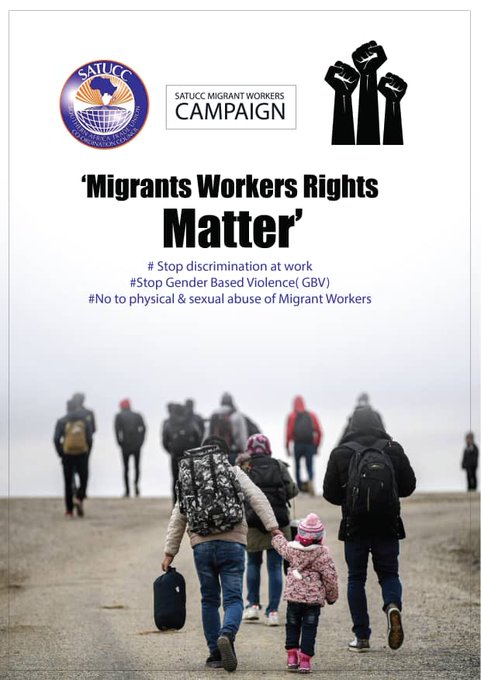By Admore Marambanyika
The Southern Africa Trade Union Coordination Council (SATUCC), a regional trade union organization representing 22 trade union federations in the Southern African Development Community (SADC) and over 5 million workers has embarked on a campaign towards the realisation and upholding of migrant workers’ rights.
The campaign seeks to synchronise national migrant labour policies within the region to enable a smooth and uniform handling of migrant worker issues within the region.
The campaign will see SATUCC affiliates engaging in workshops and media blitz to sensitize workers and policy makers on the importance of upholding migrant workers’ rights through strengthening their protection, representation and advocacy skills.
The campaign seeks to lay a foundation for a lasting solution wholly owned and accepted by stakeholders within the region in the wake of emerging complex migration issues affecting over four million migrant workers within the region.
In its concept paper the regional federation notes serious challenges in the manner in which migration issues are handled regionally.
“Labour migration and Traffic in Persons (TIP), within and around the SADC region has become more complex and dynamic than ever before, presenting policymakers with both opportunities and challenges. The region lacks coherent national labour migration policies, reliable and accurate comparable labour migration data, and standardized migration information systems. Bilateral migrant labour agreements are limited and fail to adequately protect migrants in host countries. Despite the growth in migration trends across the region, no SADC country has enacted a labour migration policy that guarantees migrant worker rights within its borders. As a result, migrants, particularly those in low skilled sectors, are subject to labour exploitation and abuses, and are typically not covered by existing policies and regulations,” reads parts of the concept note.
SATUCC said trade unions have a key role to play in defending the rights of migrant workers and addressing inequality and one way to protect migrant workers’ rights is to provide access to information on living and working in destination countries, including their rights at work.
The campaign will also largely seek to address gender based violence violations against migrants leveraging on the International Labour Organisation Convention 190 on ending Gender Based Violence and Harassment (GBVH) in the world of work.
“The feminization of international and regional migration has also increased the vulnerability of women migrant workers to discrimination, exploitation, and sexual abuse. Women migrants are more susceptible than men to gender-based violence (GBV) both sexual and physical abuse as well as discrimination at work. The region has continued to experience extremely high levels of GBV with an unprecedented surge reported during the Covid-19 lockdowns. Gender-based violence creates a barrier to migrant workers’ participation in social, economic and political life and causes significant public challenges in both sending and receiving countries in the region. At the international level, the ILO adopted Convention 190 on ending Gender Based Violence and Harassment (GBVH) in the world of work in June 2019, during the 108th International Labour Conference in Geneva. Using this convention, unions and workers can advocate for policies and negotiate for Collective Bargaining Agreements that protect workers against GBVH,” reads the concept.
A lot of women, the majority from the third world countries have suffered immense GBV at the hands of their employers in the middle east and gulf states. The women are engaged under the kafala system, a legal framework created to supply cheap, plentiful labour, defining the relationship between migrant workers and their employers. The system has become increasingly controversial, and there is growing recognition that it is rife with exploitation characterised with low wages, poor working conditions, and employee abuse. Racial discrimination and gender-based violence are endemic.
Recently the Zimbabwe government had to evacuate more than 30 women from Kuwait after responding to their plight of gross gender based violence.
The regional campaign is being held on the backdrop of serious challenges for migrant workers in the region.
A case in point is the ongoing Operation Dudula Zulu for "drive back" aimed at rooting out illegal foreign nationals in South Africa. The operation started in Soweto last year and has spread to most parts of the country targeting irregular migrants working or trading in South Africa. It is spearheaded by a groups of residents from Soweto and Alexandra that are accusing undocumented foreign nationals of being responsible for the rising levels of crimes in communities, as well as running drug and prostitution syndicates. They are demanding the immediate deportation of foreign nationals saying they are stealing their jobs.
One of Operation Dudula’s Nhlanhla Lux Dlamini, from Soweto who often dresses in a military uniform and bullet-proof vest, recently said he was simply seeking to "restore law and order".
"The law enforcement is failing us," he told reporters.
In the past such operations have degenerated into xenophobic attacks. In 2008, at least 62 foreigners were killed, while another seven were killed in similar unrests in 2015 in South Africa.








Leave a comment